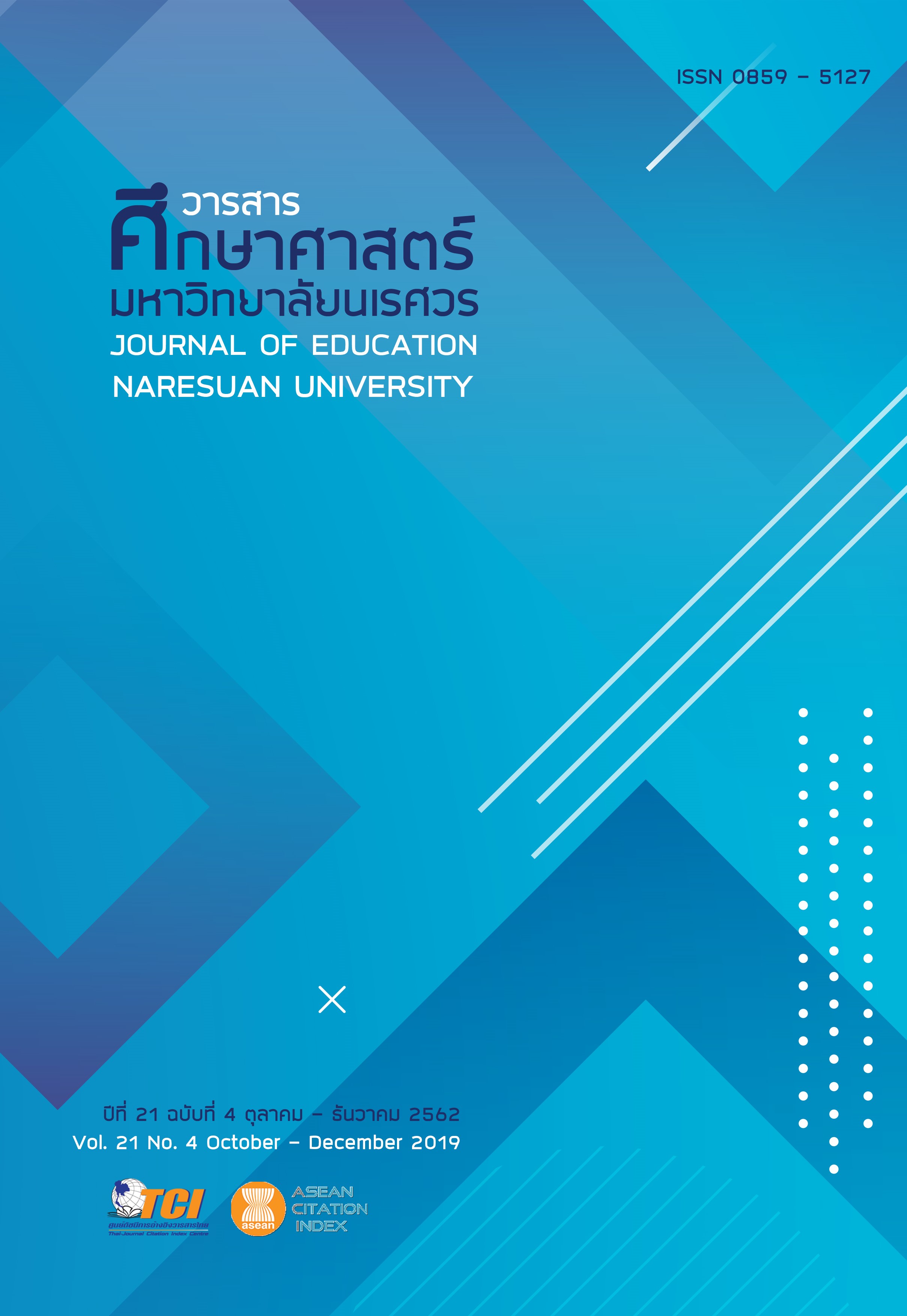การสร้างสรรค์กิจกรรมพัฒนาทักษะการเรียนรู้และทักษะชีวิตของนักเรียนผู้พักอาศัยในหอพักมูลนิธิโซ่แห่งมิตรภาพ จังหวัดเชียงใหม่ (ACTIVITIES CREATION TO DEVELOP LEARNING AND LIFE SKILLS FOR HOSTEL STUDENTS OF SOMIT FOUNDATION, CHIANG MAI PROVINCE)
Main Article Content
Abstract
การวิจัยนี้มีจุดประสงค์เพื่อ 1) ศึกษาทุนวัฒนธรรมที่เอื้อต่อการพัฒนาทักษะการเรียนรู้และทักษะชีวิตของนักเรียน 2) เพื่อสร้างสรรค์กิจกรรมการพัฒนาทักษะการเรียนรู้และทักษะชีวิตของนักเรียน 3) เพื่อประเมินความพึงพอใจของนักเรียนต่อกิจกรรมการพัฒนาทักษะการเรียนรู้และทักษะชีวิต กลุ่มตัวอย่าง คือ นักเรียนหญิงผู้พักอาศัยในหอพักมูลนิธิโซ่แห่งมิตรภาพ อำเภอเมือง จังหวัดเชียงใหม่ ที่มีอายุตั้งแต่ 13-16 ปี จำนวน 5 คน เครื่องมือที่ใช้ในการวิจัย ประกอบด้วย แบบสำรวจภูมิลำเนากลุ่มตัวอย่าง แบบสัมภาษณ์แบบเจาะลึกกลุ่มตัวอย่าง แผนกิจกรรม แบบสังเกตพฤติกรรมการพัฒนาทักษะการเรียนรู้และทักษะชีวิต และแบบสอบถามความพึงพอใจต่อการร่วมกิจกรรม โดยใช้เวลาเก็บข้อมูลตลอดภาคการเรียนฤดูร้อน ปีการศึกษา 2558 การวิจัยนี้เป็นการวิจัยเชิงคุณภาพ ข้อมูลที่ได้รับเป็นข้อมูลเชิงลึกจากความสนิทสนมและความไว้วางใจ การวิเคราะห์ข้อมูลจึงนำมาสู่ผลการวิจัยดังนี้ 1) ทุนวัฒนธรรมของนักเรียนมีผลอย่างมากต่อการพัฒนาทักษะการเรียนรู้และทักษะชีวิตนักเรียน 2) การออกแบบกิจกรรมให้นักเรียนมีส่วนร่วมในการคิด การวางแผนลำดับกิจกรรมทำให้นักเรียนรู้สึกเป็นเจ้าของกิจกรรมและนำไปสู่การพัฒนาทักษะการเรียนรู้และทักษะชีวิตของนักเรียนแต่ละคนได้อย่างมีประสิทธิภาพ 3) นักเรียนมีการพัฒนาทักษะต่างๆ มากขึ้นและมีความพึงพอใจต่อการร่วมกิจกรรมอย่างมาก
ACTIVITIES CREATION TO DEVELOP LEARNING AND LIFE SKILLS FOR HOSTEL STUDENTS OF SOMIT FOUNDATION, CHIANG MAI PROVINCE
This research objectives were 1) to study the impact of cultural capital on the development of students’ learning and life skills, 2) to create activities to develop both learning and life skills, and 3) to evaluate the results of the students’ level of satisfaction of the activities for developing learning and life skills. The focus group comprised of five female high school students whose ages range from 13 to 16 years, from the residential program of SOMIT Foundation hostel of the city of Chiang Mai province. The research tools employed were: a survey of the students’ living community and its related environment, in-depth interviews with the students, collaborative activity plans of the students, observations of the development of the students’ learning and life skills, and questionnaires to ascertain the students’ level of satisfaction in the activities. The study was conducted during the summer semester of the academic year of B.E. 2558. This was
a qualitative study, of in-depth data derived from a researcher-student relationship based on familiarity and trust. An evaluation of the data formed the conclusions of this study with the following major findings: 1) cultural capital significantly impacted the acquisition and development of students’ learning and life skills, 2) students displayed ownership when given the opportunity to participate in the planning of activities, which led to an effective development of their learning and life skills, and 3) the students developed a further array of skills, and indicated a high level of satisfaction in their participation in the activities.
Article Details
The owner of the article does not copy or violate any of its copyright. If any copyright infringement occurs or prosecution, in any case, the Editorial Board is not involved in all the rights to the owner of the article to be performed.
References
2. Chanthavanich, S. (2005). Qualitative research methodology (13th ed.). Bangkok: Chulalongkorn University Press. [in Thai]
3. Khemmani, T., et al. (2001). Learning processes, meanings, ways of development its problems. Bangkok: Office of funds in support of research. [in Thai]
4. Inter Mountain Peoples’ Education and Culture in Thailand Association. (2010). Mien tribe. Chiang Mai: IMPECT. [in Thai]
5. Lave, J., & Wenger, E. (1991). Situated Learning: legitimate peripheral participation. Cambridge, MA: Cambridge University Press.
6. Ministry of Education. (2009). The basic education core curriculum B.E. 2551 (A.D. 2008). Bangkok: The Agricultural Cooperative Federation of Thailand. [in Thai]
7. Panich, V. (2012). Methods to develop learning for the students in the 21st century (3rd ed.). Bangkok: Tathata Publication Company. [in Thai]
8. Punoi, S., Sittisomboon, M., & Onthanee, A. (2016). A development of an instructional package of cooperative learning by using case study to strengthen analytical thinking on business in daily life for Mathayomsuksa 6 students. Journal of Education Naresuan University, 18(2), 245-253. [in Thai]
9. Ritthakhananon, P. (2006). Human development. Bangkok: Thammada Press. [in Thai]
10. Ruethathip, N. (2010). Understanding impetuous adolescents and their problems. Bangkok: Matichon Publishing House. [in Thai]
11. Sopchokchai, O. (1994). Handbook on organizing meetings to brainstorm ideas for village development. Bangkok: Thailand Development Research Institute. [in Thai]
12. Wongmano, S. (2004). Life skills and adjustment of hill tribe adolescents. Chiang Mai: Chiang Mai University. [in Thai]

